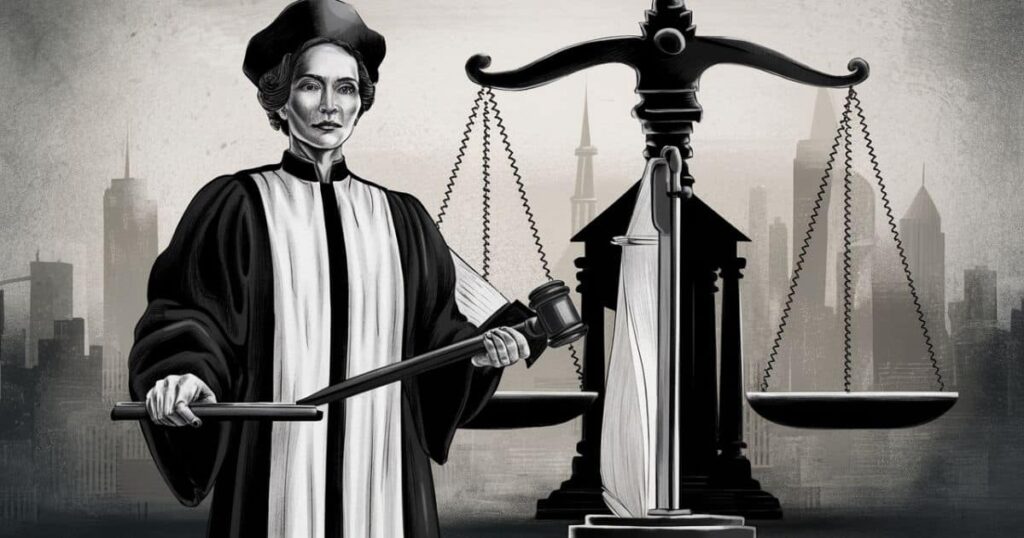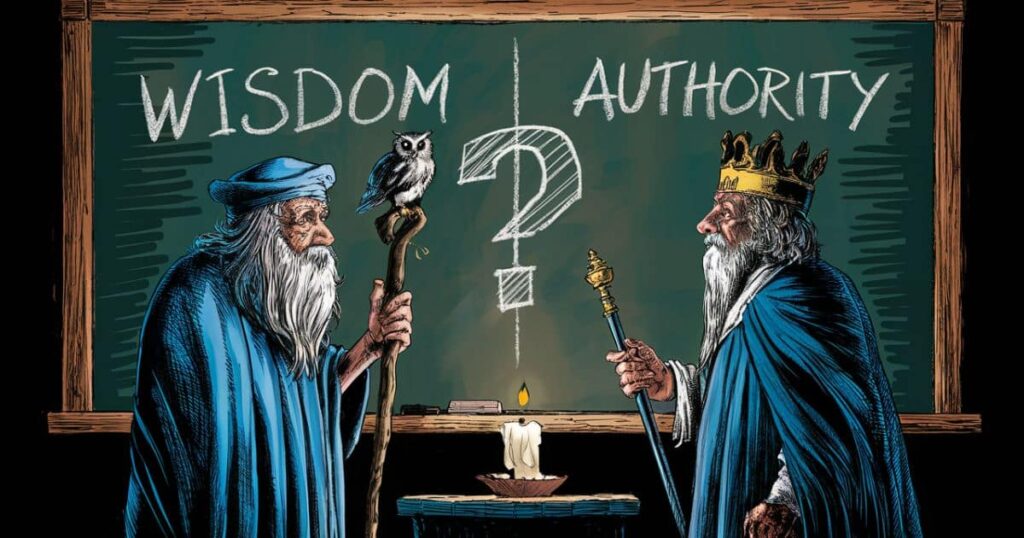Introduction
In the realm of law and governance, the tension between wisdom and authority is palpable. Ty Moffett’s famous quote, “it is not wisdom but authority that makes a law. t – tymoff,” succinctly captures this dynamic. Within this discourse, Ty Moffett’s assertion serves as a pivotal point of contemplation.
When pondering the essence of lawmaking, we are prompted to reflect on the interplay between wisdom and authority. In this ongoing dialogue, t – tymoff perspective invites us to examine the balance of power and knowledge in shaping legal frameworks. Indeed, the dichotomy between wisdom and authority remains a central theme in the evolution of legal systems.
In this comprehensive analysis, we’ll delve into this provocative claim, examining the respective roles of wisdom and authority, their interplay, and the need to strike a careful balance in lawmaking.
Understanding Wisdom
Wisdom is a multifaceted concept that combines knowledge, experience, and sound judgment. It’s the ability to discern the deeper truth, see the bigger picture, and make decisions informed by ethical principles and long-term consequences. Wisdom is often associated with qualities like:
- Insight: The capacity to grasp underlying complexities and nuances.
- Foresight: Anticipating potential ramifications and planning accordingly.
- Empathy: Considering diverse perspectives and the impact on others.
- Humility: Recognizing one’s limitations and being open to learning.
In an ideal world, wisdom would be the guiding force behind lawmaking, ensuring that legislation serves the greater good and upholds ethical values. For instance, laws aimed at environmental protection or safeguarding human rights could be informed by the wisdom of understanding our interconnectedness and the long-term implications of our actions.
The Role of Authority
Authority, on the other hand, is the power and influence to control systems, institutions, and the enforcement of rules. It’s the ability to make decisions and have them carried out, often backed by legitimacy derived from government, military, or cultural norms. Authority can manifest in various forms:
- Political authority: Government bodies with the power to enact and enforce laws.
- Legal authority: Institutions like courts and law enforcement agencies.
- Traditional authority: Cultural or religious customs that hold sway over societal norms.
While authority is necessary for laws to have weight and be implemented, it doesn’t inherently ensure that those laws are wise or serve the greater good. Throughout history, there have been numerous instances where authority has been wielded to enact laws that lack wisdom, perpetuate injustice, or prioritize narrow interests over societal well-being.
Comparing Wisdom and Authority

To better understand the implications of the statement “It is not Wisdom but Authority that makes a law. t – tymoff,” let’s contrast the conceptual differences between wisdom and authority:
| Wisdom | Authority |
|---|---|
| Based on insight, judgment, and ethics | Based on power, influence, and control |
| Considers long-term consequences | Often focused on immediate enforceability |
| Seeks to serve the greater good | Can be used to serve narrow interests |
| Requires humility and openness | Can foster a sense of infallibility |
| Transcends individual interests | Can be wielded for personal or political gain |
While wisdom and authority can sometimes align, with those in power exercising wisdom in their decision-making, there are also numerous instances where they diverge. History is replete with examples of unwise laws being enacted through the sheer force of authority, often leading to negative consequences for society.
“The wisdom of the wise and the experience of ages may be preserved by quotation.” – Isaac D’Israeli
One notable example is the Nuremberg Laws of 1935, enacted by the Nazi regime in Germany. These laws, which stripped German Jews of their citizenship and prohibited intermarriage between Jews and non-Jews, were a manifestation of authority devoid of wisdom, fueled by hatred and bigotry.
Read This Blog: Prodigy Promos Lawsuit: What You Need To Know
The Power Dynamics of “It is not wisdom but authority that makes a law”
The quote “it is not wisdom but authority that makes a law” highlights a concerning power dynamic the potential for authority to override wisdom in the legislative process. When those in positions of power prioritize their authority over wisdom, several issues can arise:
- Concentration of Power: Excessive concentration of authority in the hands of a few individuals or groups can lead to the enactment of laws that serve narrow interests rather than the greater good.
- Lack of Accountability: Without checks and balances, unchecked authority can result in laws that lack wisdom and accountability to the public.
- Perpetuation of Injustice: Authority can be used to perpetuate unjust laws or systems that favor certain groups while marginalizing others.
- Short-Term Focus: Authority figures may prioritize immediate enforceability over the long-term consequences of laws, neglecting wisdom’s foresight.
It’s crucial to recognize these power dynamics and strive for a balance between authority and wisdom in lawmaking. A system where authority is tempered by wisdom and held accountable is essential for creating just and sustainable laws.
Challenges to Wisdom and Authority
While wisdom and authority are distinct concepts, both face challenges that can undermine their effectiveness in lawmaking:
Challenges to Wisdom:
- Bias and Preconceptions: Personal biases, cultural norms, and preconceptions can distort our perception of wisdom, leading to flawed decision-making.
- Short-Term Thinking: The pressure to address immediate concerns can overshadow the long-term perspective that wisdom demands.
- Self-Interest: Personal or political agendas can cloud judgment and compromise wisdom in favor of narrow interests.
Challenges to Authority:
- Legitimacy Crises: Civil unrest, coups, or external influences can undermine the legitimacy of authority and its ability to enact and enforce laws.
- Corruption: Abuse of power and corruption can erode the credibility and integrity of authority figures and institutions.
- Resistance: Societal resistance, protests, or civil disobedience can challenge the authority’s ability to impose laws, especially those perceived as unjust or lacking wisdom.
Navigating these challenges is crucial for fostering a healthy balance between wisdom and authority in lawmaking, ensuring that laws are rooted in ethical principles while retaining the necessary enforcement mechanisms.
Finding a Balance
To create fair, just, and sustainable laws, it’s imperative to strike a balance between wisdom and authority. Neither wisdom nor authority alone is sufficient; instead, they must work in tandem, complementing and tempering each other:
- Injecting Wisdom into Legal Processes: Mechanisms like public discourse, expert advisory councils, and stakeholder consultations can help infuse wisdom into the lawmaking process, ensuring that diverse perspectives and long-term considerations are taken into account.
- Accountability and Checks on Authority: Establishing robust systems of checks and balances, transparency, and public accountability can help prevent the abuse of authority and ensure that laws are subject to scrutiny and revision based on wisdom.
- Cultivating Wise Leadership: Promoting leaders who embody both wisdom and a sense of ethical authority can help bridge the gap between these two principles, fostering a culture of responsible and enlightened lawmaking.
- Continuous Reevaluation: Encouraging a mindset of continuous reevaluation, where laws are periodically revisited and revised based on evolving wisdom and societal needs, can help maintain a healthy balance.
By embracing this balance, societies can create a legal framework that is not only enforceable but also rooted in ethical principles, foresight, and a genuine commitment to the greater good.
Wisdom in Lawmaking
“Wisdom in Lawmaking” encapsulates the notion of crafting legislation with foresight, prudence, and a deep understanding of societal needs. It involves considering diverse perspectives, consulting experts, and weighing the long-term implications of proposed laws.
Effective lawmaking requires a balance between innovation and tradition, drawing from past experiences while adapting to evolving circumstances. It necessitates transparency, accountability, and responsiveness to the concerns of citizens.
Wisdom in lawmaking entails a commitment to justice, equity, and the common good, striving to create a legal framework that promotes stability, progress, and the well-being of all members of society. It embodies the essence of good governance and fosters trust in democratic institutions.
Authority’s Role in Law

While wisdom is essential for crafting fair and ethical laws, authority plays a crucial role in giving those laws weight, enforceability, and legitimacy. Without proper authority, even the wisest laws may remain mere suggestions without any binding power. The role of authority in lawmaking includes:
- Enactment and Implementation: Legitimate authority is necessary for formally enacting laws through established legislative processes and ensuring their proper implementation across jurisdictions.
- Enforcement and Compliance: Laws require an authority figure or institution with the power to enforce them and ensure compliance, whether through law enforcement agencies, judicial systems, or other mechanisms.
- Stability and Continuity: A stable authority structure provides continuity in the application and interpretation of laws, ensuring consistency and predictability in their enforcement over time.
- Conflict Resolution: When disputes or conflicts arise over the interpretation or application of laws, authority figures, such as judges and legal experts, play a vital role in resolving these issues and upholding the rule of law.
However, it’s important to recognize the potential dangers of unchecked authority in lawmaking. Authority without the guidance of wisdom can lead to the enactment of unjust, oppressive, or shortsighted laws that prioritize power over the greater good.
Some historical examples of authority overriding wisdom in lawmaking include:
- The Nuremberg Laws in Nazi Germany, which legalized discrimination against Jewish citizens based on racial prejudice.
- The Alien and Sedition Acts in the United States, which restricted free speech and targeted political dissidents.
- The Indian Removal Act of 1830, which forcibly displaced Native American tribes from their ancestral lands.
In these instances, those in positions of authority wielded their power to enact laws that lacked wisdom, perpetuating injustice, and violating fundamental human rights. Such examples serve as cautionary tales about the importance of tempering authority with wisdom, ethics, and accountability.
The Need for Reflection
Ultimately, the interplay between wisdom and authority in lawmaking requires constant reflection and vigilance. Those in positions of authority must be willing to engage in self-examination, questioning the wisdom behind their decisions and the laws they enact.
- Encouraging Reflective Leadership: Fostering a culture where leaders are encouraged to reflect on the ethical and societal implications of their authority’s laws can help prevent the perpetuation of unwise or unjust legislation.
- Continuous Reevaluation: Rather than treating laws as immutable, a mindset of continuous reevaluation is necessary. Laws should be periodically reviewed through the lens of evolving wisdom, societal needs, and changing circumstances.
- Embracing Humility: Both wisdom and authority require a degree of humility – recognizing the limitations of one’s knowledge and power, and remaining open to new perspectives and insights.
- Public Discourse and Accountability: Promoting robust public discourse, transparency, and accountability mechanisms can help ensure that authority figures and institutions are held responsible for the wisdom (or lack thereof) behind their laws.
By cultivating an environment that values reflection, humility, and a willingness to adapt, societies can strive towards a more harmonious balance between wisdom and authority in lawmaking, creating a legal framework that serves the greater good while retaining legitimacy and enforceability.
Also Read This: Paul Mackoul MD Lawsuit: What You Need To Know
Conclusion
In conclusion, the statement “it is not wisdom but authority that makes a law” highlights a fundamental tension in the legislative process. While authority is necessary for enacting and enforcing laws, true progress and justice can only be achieved when authority is guided by wisdom a deep understanding of ethical principles, long-term consequences, and a commitment to serving the greater good. By striking a careful balance and fostering a culture of reflection, accountability, and continuous reevaluation, societies can create a legal framework that embodies both the enforceability of authority and the foresight of wisdom.
Frequently Ask Question
Which philosopher said it is not wisdom but authority that makes a law?
The philosopher Thomas Hobbes famously asserted that it is not wisdom but authority that ultimately establishes and enforces laws.
Is it not wisdom that makes a law?
While wisdom can inform the creation of just laws, the ultimate authority to establish and enforce them typically resides with governing bodies or institutions.
What is the law of wisdom?
The “law of wisdom” refers to principles and insights drawn from experience, knowledge, and discernment, guiding individuals and societies toward wise decision-making and ethical behavior.
What is the law of Word of Wisdom?
In Mormon theology, the “Word of Wisdom” is a set of dietary and health guidelines believed to be revealed by God to Joseph Smith, emphasizing moderation, abstinence from harmful substances, and the promotion of physical and spiritual well-being.
How does wisdom differ from intelligence?
While intelligence refers to cognitive abilities and problem-solving skills, wisdom encompasses deeper insights, emotional maturity, and ethical judgment, often gained through life experience.
Can authority sometimes be wise?
Yes, authority can exhibit wisdom when it acts in the best interests of society, upholding justice, fairness, and the common good.
Are there cultures where wisdom prevails over authority?
Yes, in some cultures, particularly those with strong traditions of respect for elders or communal decision-making, wisdom and consensus-building may hold greater sway than formal authority structures.
How can individuals challenge unjust authority?
Individuals can challenge unjust authority through peaceful protest, legal advocacy, civil disobedience, and grassroots organizing, seeking to promote societal change and uphold principles of justice and equality.
What historical events highlight the clash between wisdom and authority?
Historical events such as the Civil Rights Movement, the French Revolution, and the struggle for independence in colonial nations illustrate moments of conflict between entrenched authority and the aspirations for wisdom, justice, and human rights.







